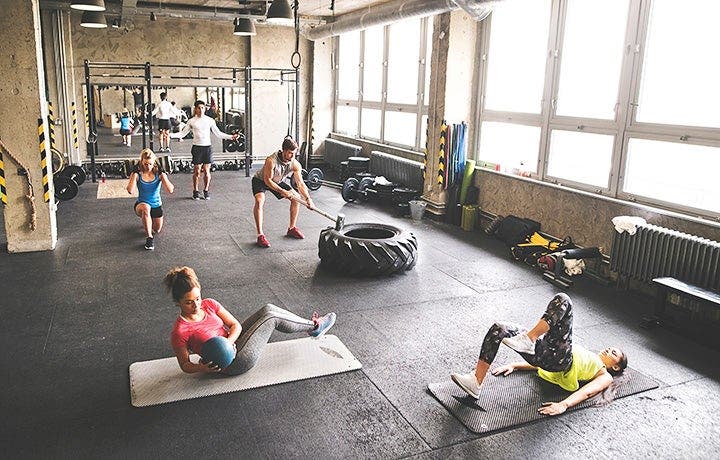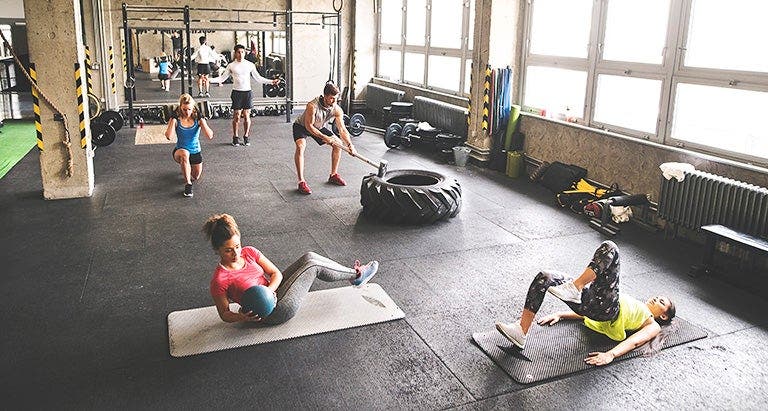Know Before You Go: CrossFit


CrossFitters are a different breed: They don’t go to gyms—they work out in a “box” where there are no treadmills or weight machines to be found. Workout plans are scrawled on a wall or a board for everyone to follow along with. These demanding lists of exercises can include anything from barbell lifts and burpees to jumping rope and running sprints. Try it, enthusiasts say, and you’ll leave feeling sweaty and exhausted, but never bored.
With over 13,000 locations in more than 140 countries, there’s a pretty good chance a CrossFit box has opened up someplace near you. So, is it worth checking out for yourself? Here’s what you need to know.
Before you begin
Know what you’ll be doing. A CrossFit box isn’t like your usual gym, with its rows of cardio machines and strength equipment. Most locations have an open space for the workouts, along with pull-up bars, gymnastics rings, stacks of weight plates, and ropes dangling from the ceiling. “CrossFit is a combination of weight lifting, gymnastics, and high-intensity interval training,” notes Julia Falamas, a coach at CrossFit SPOT in New York City. Classes generally start with a 10- to 15-minute warm up, followed by strength exercises, and then by metabolic conditioning.
Don’t be afraid. It may sound like these workouts are only for the über-fit, but CrossFit coaches insist that they can be modified to meet virtually anyone’s fitness level. “The goal of CrossFit is to make you stronger and more capable of doing anything, whether that’s picking up your kids, carrying groceries, or not getting hurt if you fall,” explains Patrick Frank, head coach of CrossFit Columbus Circle in New York City. “Every movement has a baseline and can be scaled up or down accordingly.”
For example, if kicking up into a handstand against a wall isn’t your thing, you might try holding a full push-up position—which will also help you develop shoulder strength and stability. The weight-lifting portion of your workout can be customized by using very light weights to get the form down before you move onto heavier loads. “You can have an 80-year-old and a 20-year-old doing the same workout but with different scales, and they will ideally finish at the same time,” adds Frank.
Speak up. There are plenty of variables in a CrossFit workout, so be sure to tell the coach or instructor about any preexisting injuries, or if something else is bothering you, before you start the workout. And while it may be tempting to try and imitate what others are doing around you, know your limitations. “Don’t go beyond what you are capable of,” Falamas cautions. “You don’t have to keep up with what your neighbors are doing—just work to your best abilities.”
Bring…
Athletic gear. Be sure to dress so you’re able to move around easily, whether you’re squatting, lunging, or jumping down to the floor. “You’ll be moving in all directions, so wear comfortable clothes,” says Frank.
RELATED: Find Workout Clothes You Feel Good In
Training shoes. For footwear, a flatter cross-training shoe will serve you better than a highly cushioned running shoe, suggests Falamas. “You’re doing a lot of different types of movements, and too much cushioning can actually get in your way.”
Expect to…
Find a positive environment. Yes, a CrossFit workout is tough, but what makes it a little easier is the support you’ll get from everyone else in the room. “The first person and the last person to finish a workout get the same amount of encouragement from coaches and peers,” says Falamas. “There’s a strong sense that you are all in this together and you can rely on others around you for guidance and support.”
Learn some new vocabulary. CrossFitters have their own language when it comes to their workouts. Here are a few of the most common terms:
- WOD: workout of the day
- AMRAP: doing as many reps of a move as possible in a given amount of time
- EMOM: a prescribed number of reps performed every minute on the minute
- RX: as prescribed; the recommended amount of weight and reps for an exercise
- Kipping: using momentum to get through an exercise
- PR: personal record
- 1RM: 1-rep max, or the maximum weight you can lift once
Leave tired, exhilarated, and ready for more. “You pack a lot into each single session, and the intensity is pretty high the entire time, but you’ll finish feeling proud of yourself and what you’ve been able to accomplish,” says Falamas.
